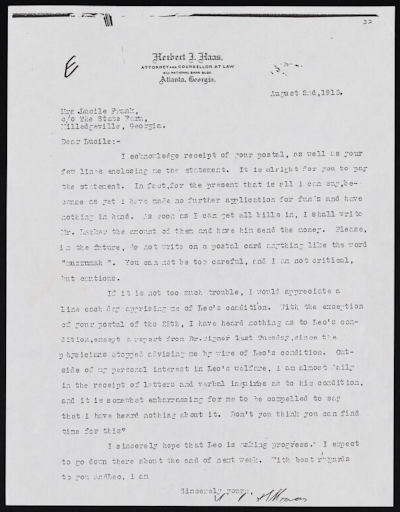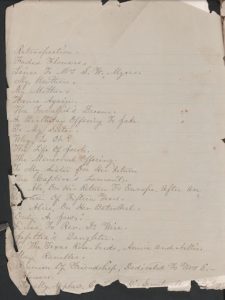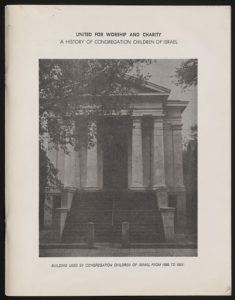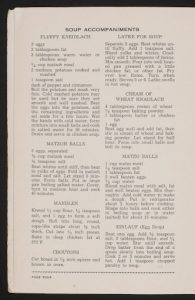The Digital Library of Georgia (DLG) has just developed a new educator resource page about the Leo Frank case, one of Georgia’s most notorious and highly publicized legal cases that ended in Frank’s kidnapping and lynching on August 17, 1915.
These resources has been chosen as part of the Georgia K-12 social studies standard SS8H7d:
Identify the ways individuals, groups, and events attempted to shape the New South (d). Examine antisemitism and the resistance to racial equality exemplified in the Leo Frank case.
Leo Max Frank (1884-1915), supervisor at the National Pencil Factory in Atlanta, was convicted for the 1913 murder of Mary Phagan, a thirteen-year-old child laborer who traveled into town from Marietta. Frank was sentenced to death after a highly sensationalized trial and appeals process that were gripped by mob violence in Georgia, much of which was heightened by sensational news coverage.
The Frank case and its extrajudicial aftermath led to both the twentieth-century reemergence of the Ku Klux Klan and the establishment of the Anti-Defamation League.
The landing page brings together:
- Resources documenting one of Georgia’s most significant twentieth-century events marked by intense social, cultural, political, geographic, and economic tensions.
- A broad range of archival materials, digitized historic newspapers, digital exhibits, and scholarship documenting one of Georgia’s most significant twentieth-century events marked by intense social, cultural, political, geographic, and economic tensions that highlight the injustices of the case and underscore the real-life impact of antisemitism, violence, and other forms of hatred.
- Digitized archival materials and family papers of Leo Frank and his attorneys document the persistent advocacy of the Atlanta and worldwide Jewish communities that supported Frank against the hatred he and his defenders faced, at significant personal risk, as well as the prevalent antisemitism in the legal system, law enforcement, popular culture, and the press.
- The newest collection of digitized materials on Leo Frank comes from the William Breman Jewish Heritage Museum and documents the cultural, political, social, geographic, and economic diversity of Georgia and the cultural struggle between Jews and non-Jews, highlight the social tensions of the early 1900s in Georgia, and emphasize the political strife experienced by those who stood up for Leo Frank’s innocence.
- A new article in the New Georgia Encyclopedia about the Atlanta Georgian illustrates how the Leo Frank case drew national attention, thanks in no small part to reporting in newspapers like the Hearst-owned Atlanta Georgian, which sensationalized the story daily with dramatic headlines and photos between 1913 and 1915, and Tom Watson’s newspaper the Jeffersonian, that polarized Americans, all the while producing controversial and historically significant examples of yellow journalism in United States history.
- Educator resource poster SS8H7d, featuring:
- Image provided by: University of Illinois at Urbana-Champaign Library, Urbana, IL.
- Rights: https://chroniclingamerica.loc.gov/about/#rights
- Accessibility: This resource is in the public domain, designed to fit an 8.5” x 11” letter-sized sheet of paper. All content is in the public domain to ensure print accessibility for all students and educators.
#LeoFrank #EducatorsofGeorgia #GeorgiaSocialStudies #GeorgiaHistory
You can view the landing page at https://sites.google.com/view/dlg-educator-resources/home/special-events/leo-frank.
The educator resource poster for the GSE SSH87d New South/Leo Frank module is available here:
Educator resource pages for other Georgia social studies standards are available here: https://sites.google.com/view/dlg-educator-resources .
#LeoFrank #EducatorsofGeorgia #GeorgiaSocialStudies #GeorgiaHistory
![Educator Resource poster SS8H7d, featuring: The day book. [volume] (Chicago, IL), 03 June 1915.](https://blog.dlg.galileo.usg.edu/wp-content/uploads/2024/04/SSH87d-791x1024.jpg)
Image provided by: University of Illinois at Urbana-Champaign Library, Urbana, IL.
Rights: https://chroniclingamerica.loc.gov/about/#rights
Accessibility: This resource is in the public domain, designed to fit an 8.5” x 11” letter-sized sheet of paper. All content is in the public domain to ensure print accessibility for all students and educators.





